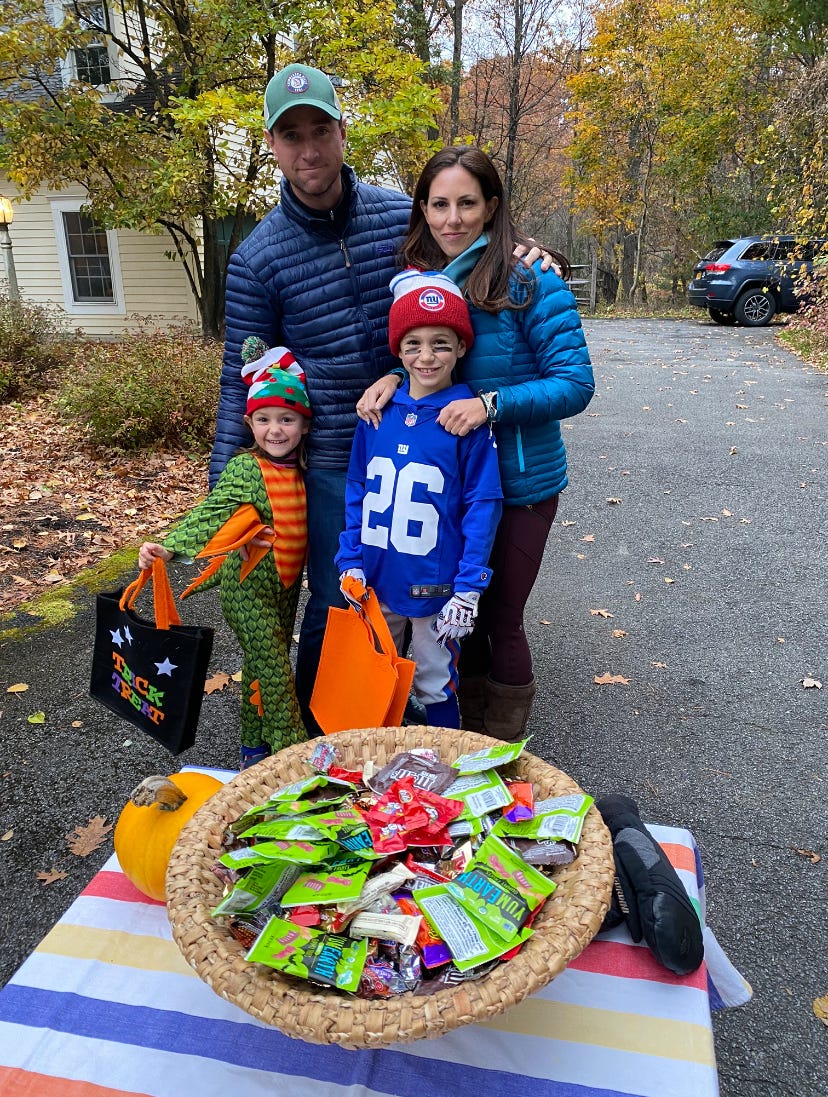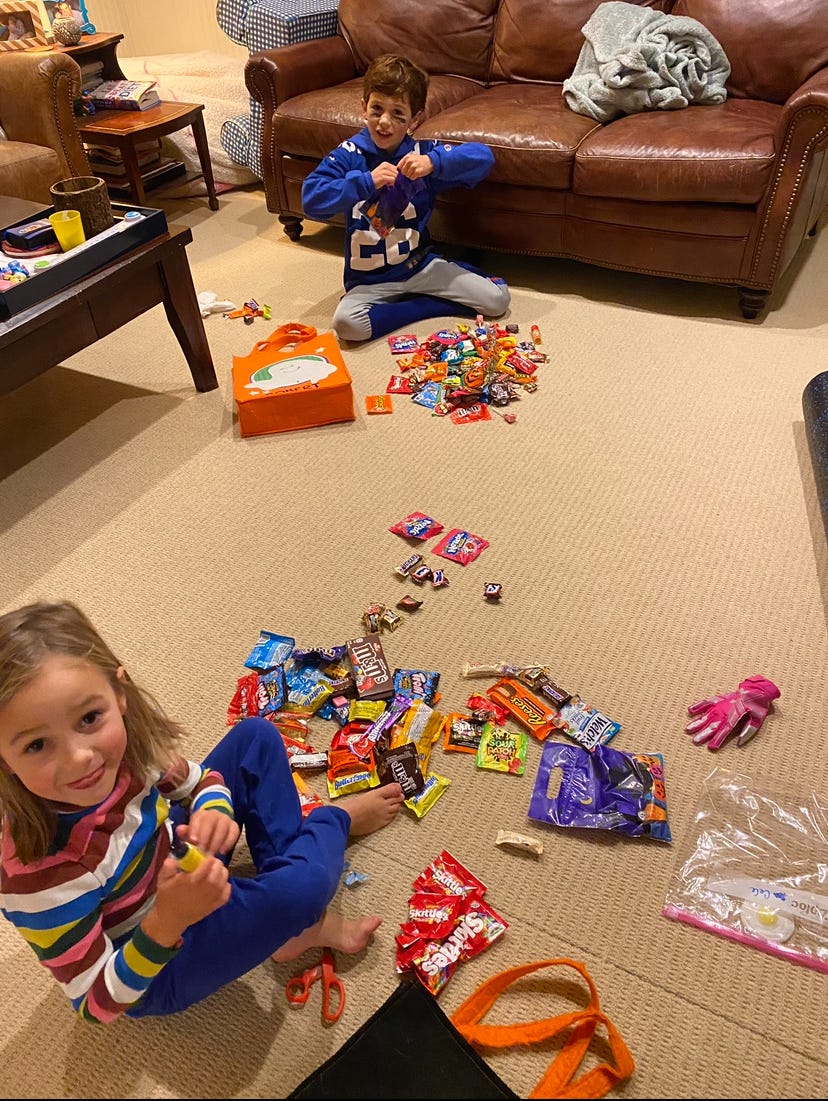Tricks to enjoy your Halloween Treats
why "saving up" for special meals often backfires, how to motivate for a workout, and how to use our awareness to understand the reward value of habits.
Another Monday, another Noosletter for you! We are entering deep fall… It’s the last Monday of October and there are three days until Halloween. Get the sardine tins, the mini salad bags and baby carrots ready to give out instead of candy — just kidding 🤣!! Being in this field, we sometimes get the side eye when candy is brought up — but we don’t have a problem with Halloween candy and indulging in some sweet treats, and will definitely be trick-or-treating on Thursday. We’ll leave handing out toothbrushes to my neighbor, who is a dentist. Today we are discussing why “saving up” for that one meal or holiday backfires, why you’ll almost never regret a workout, and how to use our awareness to understand the reward value of habits.
Nutrition
After reading last week’s Noosletter about being a “food snob,” are you choosing your food more carefully/have you experimented with being pickier with foods rather than settling just because? Have you tried something and thought, “gosh I don’t love it, why would I eat this?” and stopped eating, or “damn, this is tasty, I’m going to really savor,” then go on to slowly enjoy? We hope so! I recently had a conversation with a patient where we focused on tuning into foods they enjoy, and saying no to foods they don’t actually like or that aren’t serving them, encouraging them to put their “food snob” cap on.
After further discussion, we discovered that they were “holding out” for a meal they’d consume later in the day. I see this a lot with holiday eating or when there is an outlier event that involves food. We tend to severely eat less during the day, “saving up” for the event. Have you ever done this? Connecting the dots later in the conversation, my patient realized that when they were starving, it was really hard to say no to foods they didn’t like, know when to stop eating, and couldn’t identify which foods made them feel crummy. At the first opportunity to really eat, we feel an intensity that is uncontrollable, and can act desperately when faced with food choices. Any ability to stick to a “plan” is fleeting and irrelevant. We usually overeat, with binge-like tendencies.
When we rigidly limit the amount of food we consume throughout the day in hopes of “saving up” for later, we set ourselves up to overeat — eating past discomfort and completely throwing aside our hunger cues. When you are underfed, you also tend to obsess about food. Instead of this restriction/deprivation-binge/guilt cycle how about shifting to consuming balanced, filling meals throughout the day?
Nourishing our bodies and respecting our body's hunger cues throughout the day will help prevent intense cravings and overeating at night. Furthermore, feeling nourished will promote contentment, which is a great way to enjoy the holidays. Yes, it’s easy to write and read about, but in order to truly understand the benefits of nourishing and trusting your body, you have to experiment and experience these sensations yourself. Give it a try, you will feel nourished and centered, and ready to enjoy your company and your food.
A couple of tips for Halloween…
For anyone who is feeling stressed about Halloween, remember:
It’s one day
You and your children are building memories
Eat dinner before trick-or-treating
Let your children count, sort, and eat the candy!
(Oh and expect meltdowns!)
Don’t forget, like adults, controlling and restricting food (in this case, candy) with children can cause them to fixate on it or become “obsessed” with the food. We all want what we can’t have (Bradley Cooper? lol am I right?!) — it’s human nature. Take away the candy, and kids can’t stop thinking about it. Don’t make it a “thing,” perhaps they pick out one piece a day for their lunch for the following week or two? Do what works best for your family, but at the end of the day, it’s only one night, try and relax and have some fun!
Movement
With daylight savings around the corner and temps dipping in the northeast, we have been talking a lot about our natural decrease in movement. Last week we talked about how it affects our NEAT — we are just less likely to move when it’s not summer and we have the tendency to be more active. Have you ever visited somewhere warm (Florida/California for instance) and noticed how active everyone is? It’s such a mood/energy booster for me to see people active and outside, it’s contagious! It can be harder to be consistent with workouts in the late fall/winter — I get it! I am definitely NOT always motivated to workout…my bed feels cozy in the morning, I HATE being cold, sniffles/coughs are going around and it’s so easy to convince myself that I’ll fit a workout in later in the day as I snooze my morning alarm. So, what gets me out of bed every time, or out into the cold for an early run or walk? A reminder to myself that I have never regretted a workout.
I’ve never finished a workout and thought “shit, I really wish I didn’t do that.” Even if a workout doesn’t go according to plan (getting a cramp when I run/feeling weak when I lift/kids interrupt, etc), I still usually feel better than I did before I started. I used to workout to get in shape for sports (20 years ago, but feels like yesterday 😂), but now, I do it primarily for my mental health, and a close second for my fitness. My sister Caroline coined this phrase… working out depletes my “rage battery” — it’s a way to tire myself out mentally and physically, so I can start the day with a clean slate. I’m happier, more even keeled, and ready for the challenges that my kids (and everyone else) might throw at me.
I definitely feel more energized after a workout, too, which may seem counterintuitive. You need energy to workout, but if you’re out of practice, it seems like a much bigger undertaking to make it a daily routine. Once I get into a cycle of working out 5-6 days a week — and I know this may sound crazy — it’s harder to take a day off. I feel restless and I crave the endorphin rush I get from a workout. But…that feeling takes time to get to. The first few workouts after not exercising for a while can be a shock to the system, and it’s hard to enjoy when it feels like every workout is uphill. Once momentum is in place, the results and benefits seem to come way more easily. It’s a matter of building a habit or a standard, rather than relying on motivation. So… next time it feels too dark or cold, or something is giving you a little push back when it comes to working out, remember: you won’t regret it. Our bodies are made to move, and motion is lotion — the more you incorporate regular exercise into your routine, the more you will crave it, and I promise, you won’t regret it.
Behavior
Why is it so hard to change a habit? Our brains are wired with a reward based system — that’s how we survived as cavemen and continue to be motivated today. Dr. Jud Brewer created the video above, which illustrates why habits both help and hurt us and how to interrupt behavior loops that aren’t serving us. This is pretty helpful stuff if you’re trying to figure out why you continue a certain habit even when you don’t like it! Oftentimes we rely on willpower or blame the lack of it, when it comes to breaking habits, but, according to Brewer, it doesn’t have to be a game of willpower after all.
As we’ve mentioned before, habits can be really helpful — it’s nice to not have to relearn how to drive a car or wash your hair every time. However, if you have a habit of grabbing some gummy bears every time you pass the pantry and you are trying to cut down on sugar (or pour a glass of wine every night and you are trying to reduce consumption), then it’s time to change your behavior. In the video, Brewer reveals (**spoiler alert**) that awareness is key to behavior change. As we often highlight at Noos, if you elevate your awareness, you will elevate your life (and not eat stale popcorn). Habits can be like putting your car in cruise control — helpful when you are going in the right direction, but detrimental if they are steering you off course.
“By paying attention to the results of the behavior in the present moment, we can jolt our brain out of habit autopilot, and see and feel exactly how rewarding or unrewarding it is for us right now.” - Jud Brewer
Brewer is the director of Research and Innovation at Brown University's Mindfulness Center where he is a pioneer of how mindfulness affects the brain's habit formation patterns. He has helped many with smoking cessation. We all know that smoking cigarettes is bad for our health. Does that stop people from smoking? Typically, it takes more than health warnings to get people to stop (it is highly addictive after all). Brewer worked with a group of smokers, and instead of asking them to stop due to its negative health effects, he allowed them to continue smoking, but asked them to be really present as they lit up. How does it taste? How does it smell? When smokers became aware of the actual act of smoking (beyond the ritual of it), and were mindful, many realized they didn’t actually like it — the smoke tasted like chemicals and and smelled like “stinky cheese.” Gross! The power of our awareness is greater than we might give it credit for. Next time you are in the act of something habitual that doesn’t serve you, try elevating your awareness in the moment. That awareness serves as the essential tool for rewiring these deeply ingrained patterns.
Check out the Habit Mapper below from Dr. Brewer. It’s a simple tool that will help you understand how your brain works — try using it to change your behavior and break bad habits.


Until next time…










I have to say, I am not a fan of Halloween. First, dressing kids up in Canada at the end of October, 9 times out of 10, they were trick or treating in the snow so costumes had to fit over snowsuits and boots. Then the candy 🙄. All the sugar..the start to everyone and their dog getting sick. But of course the kids loved it. So I was not the mom to ruin it. My one rule for my kids was they got to pick 10 items to have and then I would pay them money in exchange for the rest of their haul and they could buy a toy, book etc..they were okay with. They got to dress up, have fun with their friends and have a few treats.
Loved your section on Movement! Have you got a few suggestions for someone who maniac about the aerobic part of her workout, but wants to add some light, upper body work - like 6 - 8 minutes - to her daily routine?!